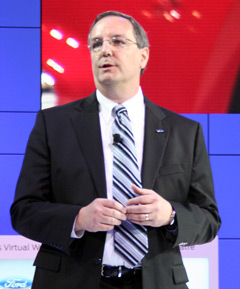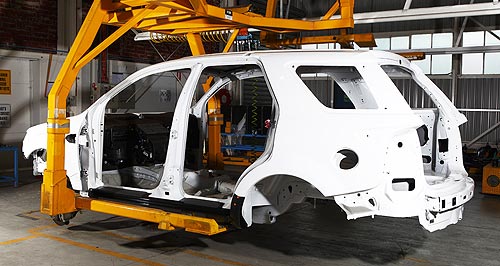Make / Model Search
News - General News - PartsFord talks tough to parts makersParts price rises: Ford Australia chief Bob Graziano has urged local parts makers to put climate change and the carbon price front and centre on their stage. FAPM agrees that parts makers must try to deal with climate change and carbon tax11 Jul 2011 By IAN PORTER FORD Australia has warned local parts makers they need to start to work immediately to offset the effects of climate change and the carbon tax or risk becoming uncompetitive and losing out to imported parts. And the Cooperative Research Centre for Advanced Automotive Technology also stressed the need to keep improving management and production processes in order to survive what are difficult times in the industry. Ford president Bob Graziano told the annual conference of the Federation of Automotive Products Manufacturers it was important that suppliers recognised the difficulties climate change posed to both Ford and to the suppliers’ own businesses. “Climate change is front and centre on the political stage,” Mr Graziano told the FAPM members. “I fear that, perhaps, it may not yet be front and centre on your stage. “Climate change will impact the price of a host of energy-intensive commodities: metal, glass, plastic and fuels. All of these are inputs to your businesses, and any price changes will find their way along the supply chain.” He warned suppliers they had to work hard to minimise any price changes caused by climate change and the carbon tax.  Left: Ford Australia president Bob Graziano. Left: Ford Australia president Bob Graziano.“It is imperative that we recognise just what climate change can mean to our businesses.” He said suppliers should not wait for all the detail on climate change to emerge before taking action. “It is a ‘now’ issue,” he warned. “How will you address the demand to reduce energy use, or commodity use by streamlining your processes? How will you enhance quality and throughput? And how will you achieve all of this without loss of competitive relativity against imported products from a wide range of developing countries? “You need to ensure your organisations are fully committed to these programs.” Mr Graziano said there was plenty of assistance available to suppliers and no reason not to act now. “There are a suite of supplier development programs currently on the table (through the FAPM). These are complemented by a similar suite of programs on offer to you by the three vehicle manufacturers.” He said there wasn’t a supplier that could not benefit from the help that is available, just as there was no vehicle manufacturer that could not benefit. “Ladies and gentlemen, the vehicle industry needs you to step up like never before. Australia needs you to step up. Mr Graziano believes the local industry is in a delicate position with historically high trade exposure, a reference to the high dollar and the lowest tariffs of any car-making country. “I need to appreciate that Australian motorists are prepared to, and do, buy cars from any country in the world. You need to appreciate that components and technologies can be sourced from any country in the world. “This is not a subtle cost-down message. Rather, it is a statement of fact. Globalisation has changed the ground rules forever.” The chief of the AutoCRC’s supplier improvement program also urged suppliers to take advantage of a range of business improvement programs developed for the Automotive Supplier Excellence Australia (ASEA) program. ASEA director Linsey Siede admitted he was frustrated by the general lack of recognition among parts makers of the need to improve, saying it reflected poorly on the standard of management in the industry. Only a minority of the 200-plus parts supplies in Australia had realised they could benefit from being benchmarked against the best and shown where to focus improvement efforts, he said. Indeed, in a reflection of this apathy, only around 20 companies thought it worthwhile attending last week’s conference, leading Mr Siede to note that “the elephant is not in the room”.  Read more |
Click to shareGeneral News articlesResearch General News Motor industry news |











Facebook Twitter Instagram